Feature: Chinese medical team provides quality health service in Ethiopia
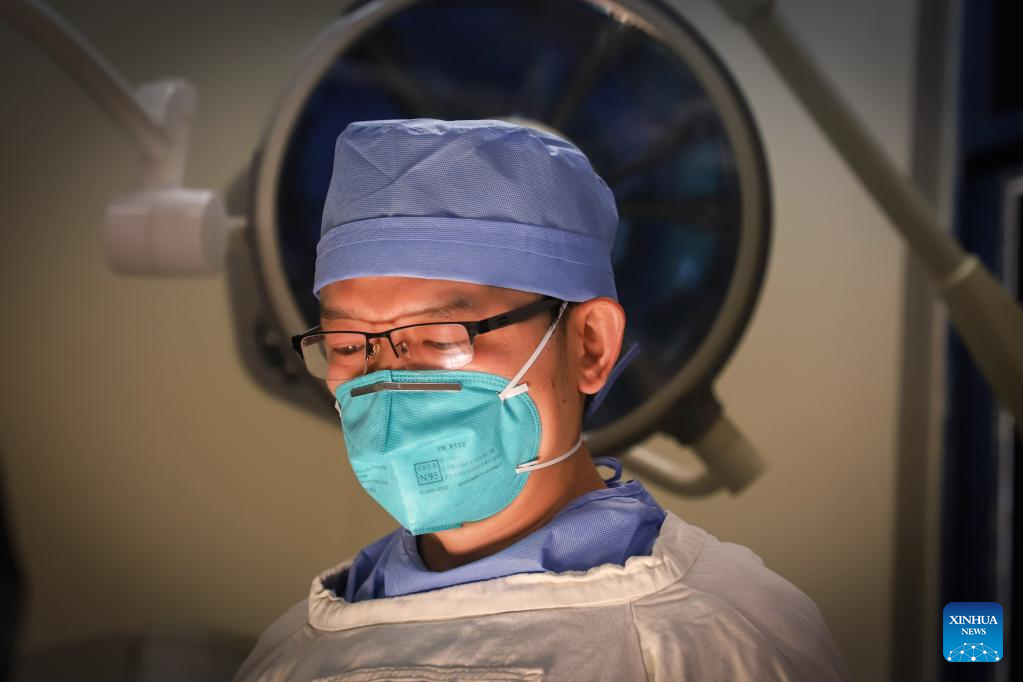
Photo taken on Aug. 18, 2022 shows Yang Yaohui, a surgeon of the 23rd batch of the Chinese medical team, working in the operation room at the Ethiopia-China Friendship Hospital, also known as the Tirunesh Beijing Hospital, in the southeastern suburb of Addis Ababa, Ethiopia. (Xinhua/Michael Tewelde)
ADDIS ABABA, Aug. 19 (Xinhua) -- In the operation room at the Ethiopia-China Friendship Hospital, Ethiopian health experts and their Chinese counterparts perform major operations including cesarean section, helping mothers give births through surgical incisions.
"The China medical team is helping deliver quality health care in Ethiopia besides sharing expertise with local health workers," said Yewbdar Tassew, one of the nurses who work as an anesthetist at the hospital, also known as the Tirunesh Beijing Hospital.
"The support of the Chinese medical team is immense and without their help, such better health care would not be possible," said Tassew in a recent interview with Xinhua.
According to Tassew who also works as a case team leader in the operation room, the Chinese anesthesiologists have taught the local nurses how to carry out regional anesthesia, a type of pain management for surgery that numbs a large part of the body, such as from the waist down.
"We have gained several techniques of quality health service delivery including applying anesthesia using ultrasound and handling video laryngoscopes," said Tassew, noting that the Chinese doctors also helped raise the number of local anesthetists to 20 now from 10 three years ago.
China has been sending medical missions to Ethiopia since 1974 and currently the 23rd batch of the Chinese medical team, consisting of 16 medical professionals, is offering all kinds of health care services at the hospital.
"We have treated nearly 20,000 Ethiopians who are in dire need of health care over the past half a year," Zhang Zhiren, team leader of the 23rd Chinese medical team in Ethiopia, told Xinhua.
Noting that the team also carried out more than 300 surgical operations and saved the lives of many critically ill patients, Zhang said the Chinese medical team is dedicated to healing the wounded, rescuing the dying and providing boundless love and respect to patients.
Zhang said the medical team would continue working aggressively on transferring knowledge and skills to local colleagues, familiarizing them with modern medical equipment and advanced technologies.
"We scale up our multidisciplinary diagnosis and treatment so as to provide better health care to trauma patients," he said, highlighting the need to deliver comprehensive obstetrics, gynecology, and general surgery treatments at the hospital over the coming months.
Getie Sima, 62, is one of the patients receiving treatment at the hospital after suffering from a head injury. She said her health is improving every day with the support of Chinese doctors at the hospital.
"A Chinese doctor has taken care of me very well. He provides me with medicine and treatment every day. The headache I suffered earlier has gone," said Sima.
Wang Zaizhong, a Chinese neurosurgeon, who performed emergency surgery for Sima, said his patient's health condition has improved and she started walking.
Wang said that there are several trauma patients in the hospital and that they require close follow-up with well-trained neurosurgeons.
China's continued support to Ethiopia's public health sector has not been limited to sending medical teams. A variety of medical equipment has been sent to the East African country over the years.
"We have been receiving the much-needed medical equipment and job training from each Chinese medical team," said Selamawit Getu, one of the nurses working in the cesarean section room.
"With the help of the Chinese doctors, the staying time of patients at the hospital has reduced significantly as they use high-tech machines and medical equipment," she added.
Illibabur Boru, CEO of the Tirunesh Beijing Hospital, said Ethiopian and Chinese doctors work shoulder to shoulder in treating patients and offering much-needed medical services at the hospital in the southeastern suburb of the Ethiopian capital Addis Ababa.
"They (Chinese doctors) usually work with our doctors and they are everywhere. Some of them are radiologists, some of them are gynecologists, others are orthopedic surgeons, neurosurgeons, acupuncture specialists, neurologists, and so on," Boru told Xinhua recently.
Appreciating the work culture of the Chinese doctors, Boru said the Chinese medical team has helped the East African nation treat chronic illness and perform complex surgical operations.
Li Wangzhen, a member of the 23rd batch of the China medical team, also stated that the knowledge transfer is two-way and has mutual benefits.
"Ethiopian doctors and all patients are friendly. We have established a multi-disciplinary system in which we exchange knowledge and experience," Li said.
Li, who works as an ultrasound doctor at the hospital, said patients suffering from acute abdomen traumas largely caused by traffic accidents, and obstetric and cardiovascular illnesses are mostly admitted to the hospital.
The China-aided Tirunesh Beijing Hospital has already established relationships with different hospitals in China where Ethiopian doctors had been attending short-term training and drawing experiences until the outbreak of the COVID-19 pandemic.
The 23rd Chinese medical team, under the team leader of Zhang, occasionally organizes lectures on the Chinese language and medicine as part of an effort to fill the knowledge gap and share the Chinese medical technology and treatment with Ethiopians.
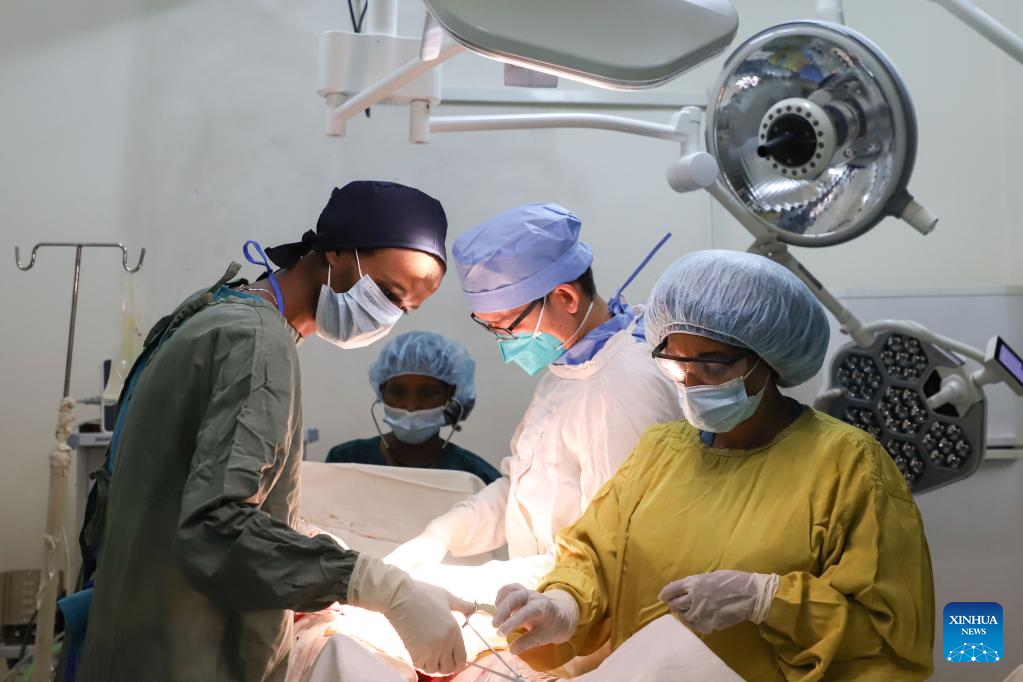
Yang Yaohui (M), a surgeon of the 23rd batch of the Chinese medical team, works with Ethiopian colleagues in the operation room at the Ethiopia-China Friendship Hospital, also known as the Tirunesh Beijing Hospital, in the southeastern suburb of Addis Ababa, Ethiopia, Aug. 18, 2022. (Xinhua/Michael Tewelde)
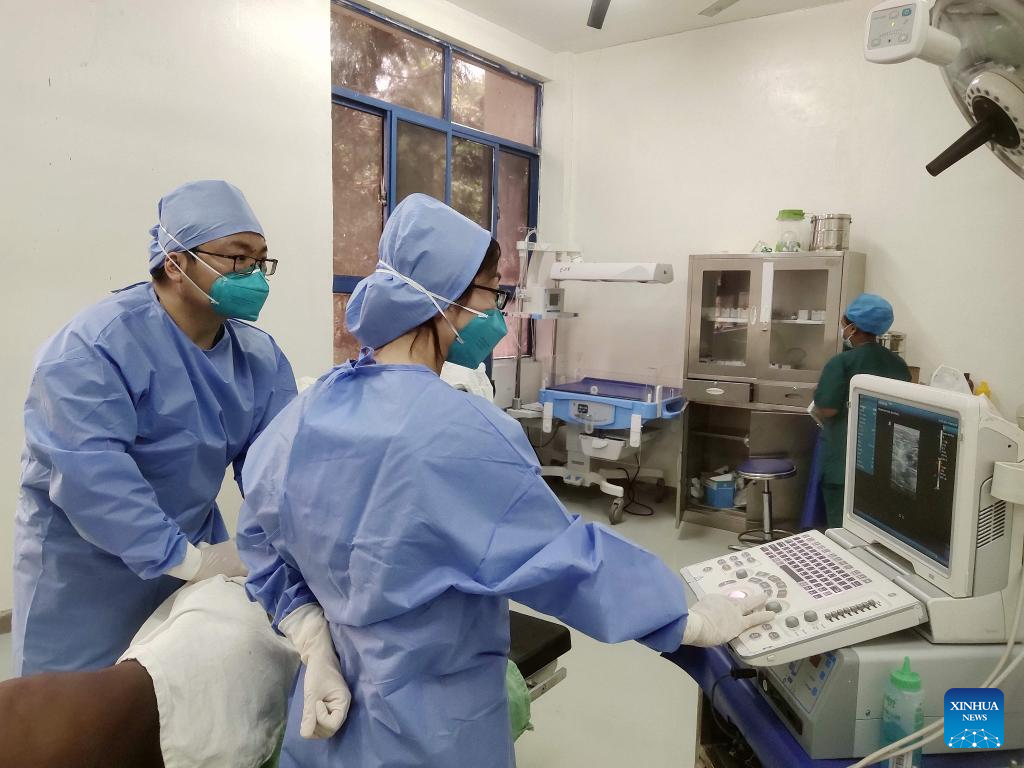
Doctors of the 23rd batch of the Chinese medical team check a patient's body condition with ultrasonoscope at the Ethiopia-China Friendship Hospital, also known as the Tirunesh Beijing Hospital, in the southeastern suburb of Addis Ababa, Ethiopia, May 22, 2022. (Str/Xinhua)
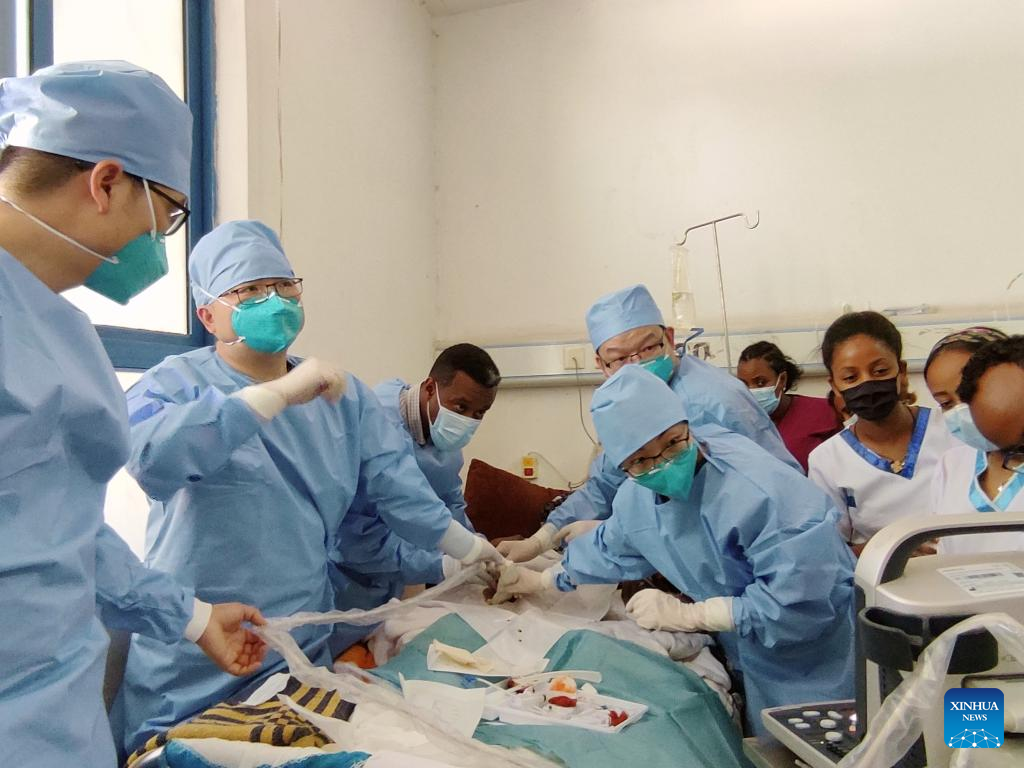
Doctors of the 23rd batch of the Chinese medical team carry out a surgical operation at the Ethiopia-China Friendship Hospital, also known as the Tirunesh Beijing Hospital, in the southeastern suburb of Addis Ababa, Ethiopia, March 31, 2022. (Str/Xinhua)
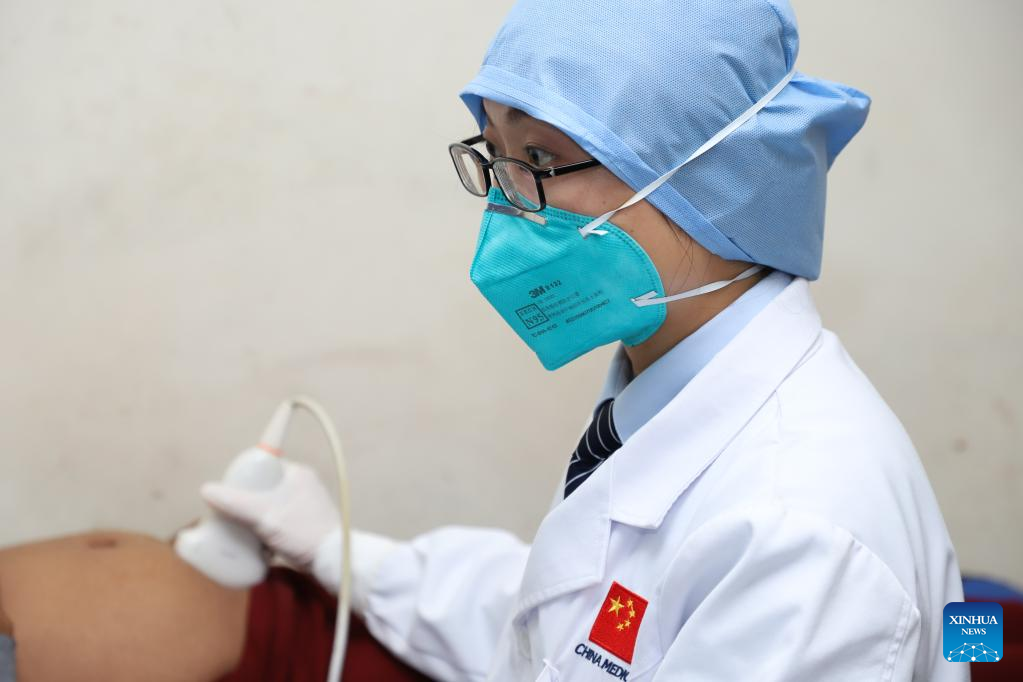
Li Wangzhen, an ultrasound specialist of the 23rd batch of the Chinese medical team, conducts medical check-up for a patient at the Ethiopia-China Friendship Hospital, also known as the Tirunesh Beijing Hospital, in the southeastern suburb of Addis Ababa, Ethiopia, Aug. 18, 2022. (Xinhua/Michael Tewelde)
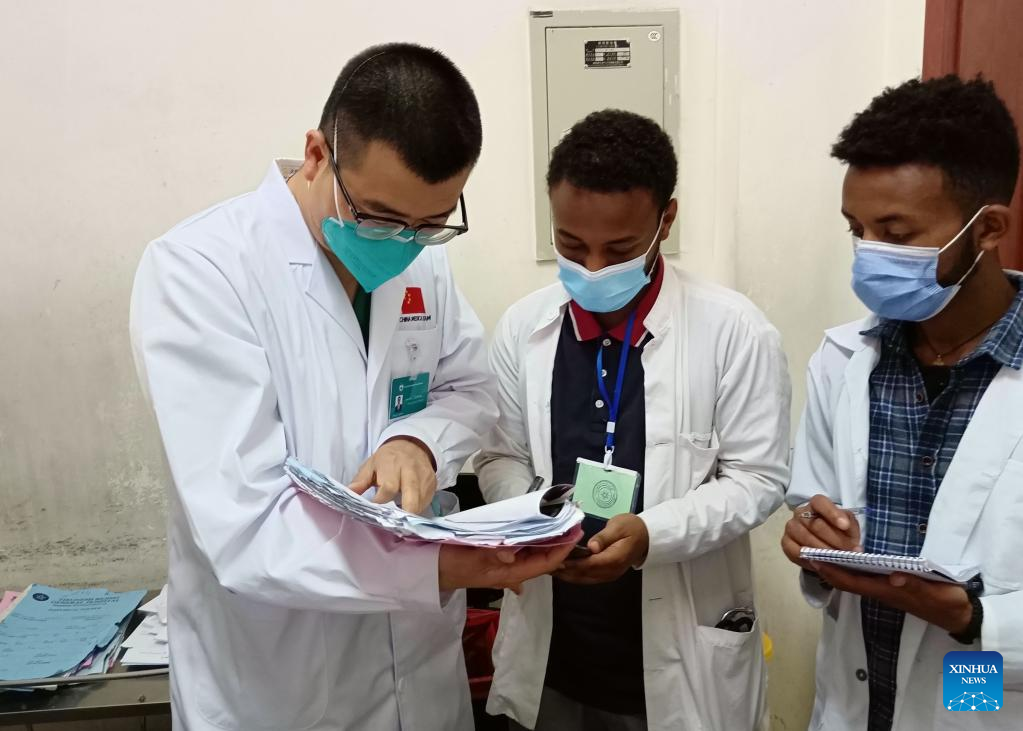
A Chinese doctor exchanges with local colleagues at the Ethiopia-China Friendship Hospital, also known as the Tirunesh Beijing Hospital, in the southeastern suburb of Addis Ababa, Ethiopia, March 22, 2022. (Str/Xinhua)
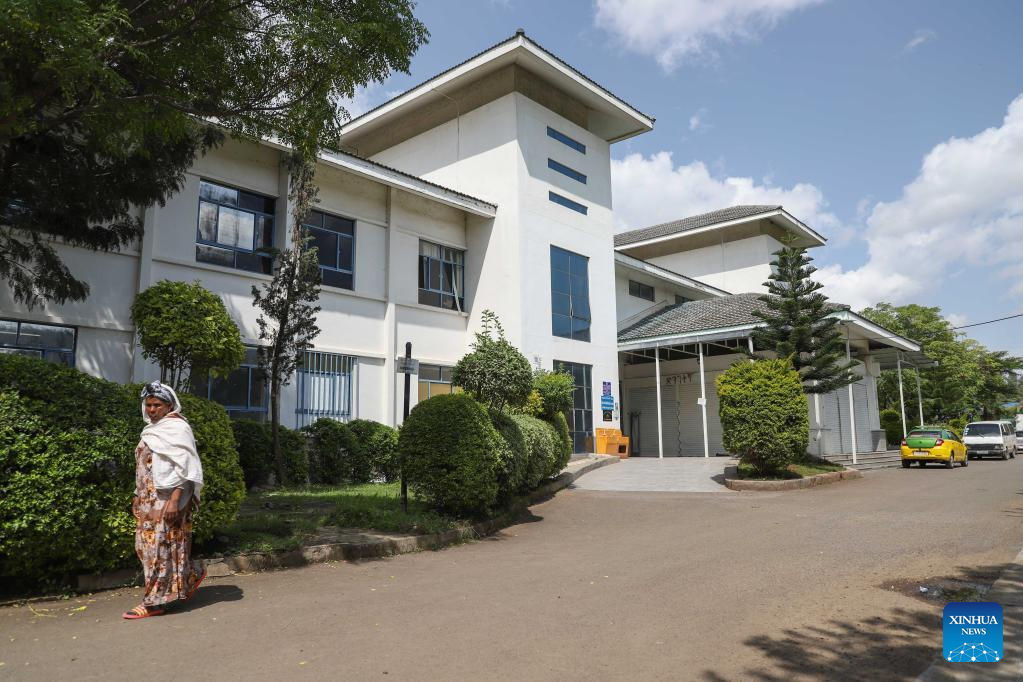
Photo taken on Aug. 17, 2022 shows the Ethiopia-China Friendship Hospital, also known as the Tirunesh Beijing Hospital, in the southeastern suburb of Addis Ababa, Ethiopia. (Xinhua/Michael Tewelde)


